Man Kills Girlfriend's Vicious Dog In Self-Defense, She Accuses Him Of Planning It And Ruining Their Relationship
In a small rural community where carrying pocket knives is common, OP (26) faced a life-altering incident that put his relationship on the brink of collapse. OP's girlfriend's parents owned a notoriously aggressive Doberman named Satan.
The dog's reputation was far from angelic. With a history of killing a cat and attacking neighbors, Satan was an animal that OP had actively avoided.
The couple was invited to her parents' home for dinner, and OP reluctantly agreed, but only if Satan was confined to the basement. The night began pleasantly, with OP even helping John in the yard. However, when John inadvertently left Satan unconfined, chaos erupted.
Satan attacked OP with clear lethal intent. With the father unable to restrain the dog, OP found himself in a horrifying struggle for survival. In a desperate bid to save himself, he used his pocket knife to fend off the dog, ultimately killing it.
The immediate aftermath was filled with shock, apologies, and medical care. But the real crisis began when OP's girlfriend returned home. Rather than expressing concern for OP's welfare, she was consumed with grief and anger over the dog's death.
The incident has since escalated into a relationship crisis. OP's girlfriend accused him of wanting to kill the dog, ignoring his pleas of self-defense and his obvious physical injuries. The situation remains tense and unresolved, with both sides entrenched in their beliefs.
John and Jane are trying to mediate, but the question remains: can the relationship survive this tragic and traumatic event?
The title is bone-chilling

OP says that his girlfriend's parents have a vicious dog
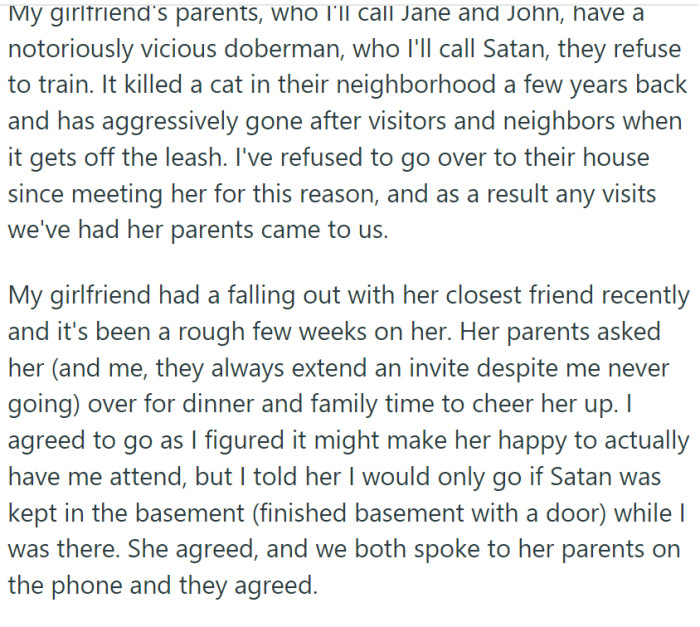
OP and his girlfriend came over for dinner, and she checked if Satan was confined (OP requested)
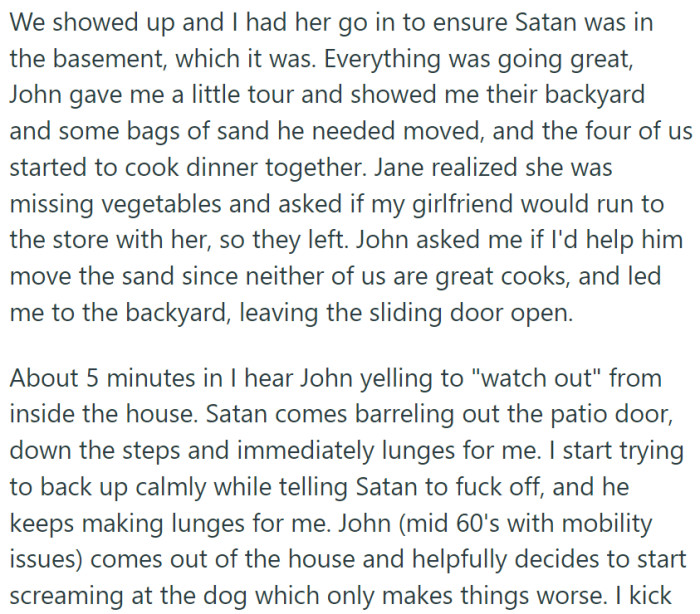
Dynamics of Relationship Conflict
Relationship conflict often surfaces in unexpected situations, especially when one partner feels threatened. Research indicates that perceived threats can lead to defensive behaviors, as noted by Dr. John Gottman, a leading relationship researcher.
His studies reveal that negative interpretations of a partner’s actions can escalate tensions, ultimately jeopardizing the relationship. Accusations like those made by OP's girlfriend may reflect deeper insecurities and fears about loss, suggesting that effective communication and understanding are vital in resolving conflicts.
Navigating Difficult Conversations
Navigating tough conversations requires emotional intelligence and effective communication skills. Experts suggest using 'I' statements to express feelings without casting blame, which can help de-escalate tensions.
In situations like OP's, where accusations may arise, it’s vital to validate each other's feelings and clarify intentions. According to research published in the Journal of Marriage and Family, couples who communicate openly and honestly are more likely to achieve constructive resolutions, ultimately strengthening their relationship.
Conflict and Animal Behavior
Dr. Angela Roberts, a forensic psychologist, emphasizes that conflicts involving pets can often reveal deeper relational issues between partners.
In this case, the man's actions reflect a perceived threat, which triggered a protective response towards himself and his girlfriend.
OP was trying to fight off the dog. He had to use his pocket knife
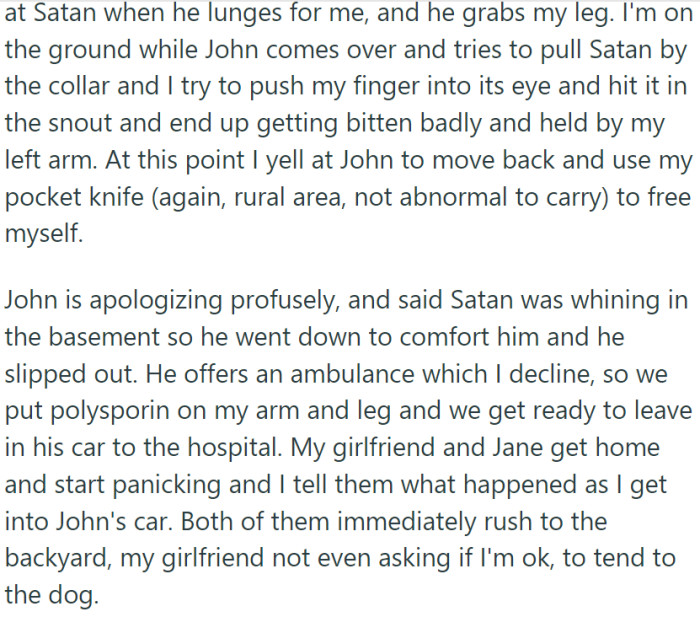
OP went to a hospital, and his girlfriend didn't even ask about his wounds
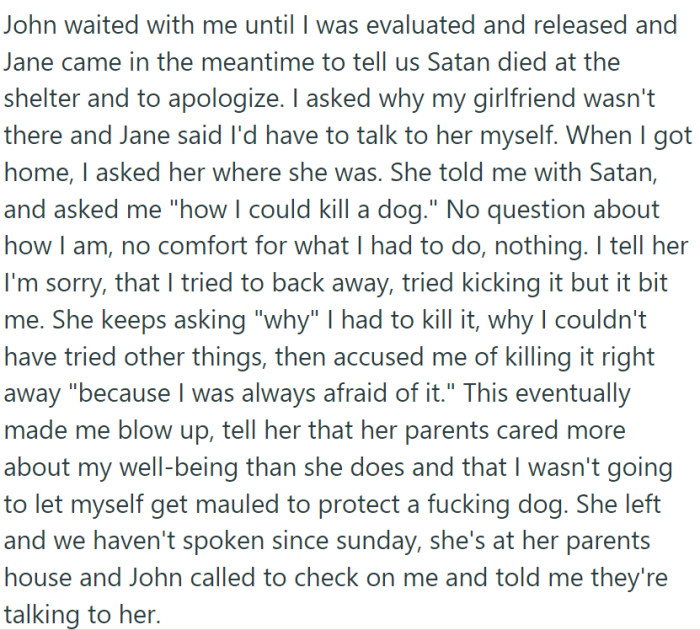
Neither of them is willing to budge
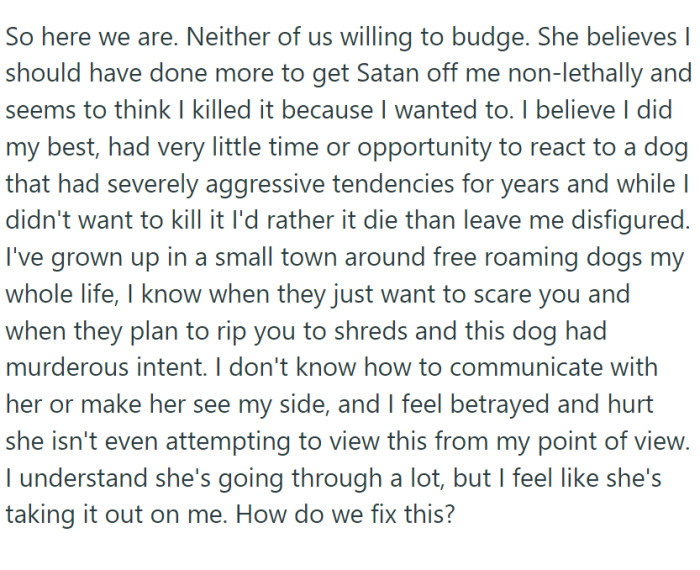
Understanding the psychology of pet ownership is crucial, especially when aggressive behavior is involved. A study published in the Journal of Applied Animal Welfare Science highlights the phenomenon of 'owner denial,' where individuals underestimate the risks posed by their pets.
This denial can stem from emotional attachment, leading to a skewed perception of threat. It's essential for pet owners to engage in open discussions about their pets' behaviors and consider professional assessments to ensure safety for everyone involved.
Research in behavioral psychology shows that perceptions of threat can lead to defensive actions, often resulting in heightened emotional responses.
The American Psychological Association highlights how these responses can escalate conflicts, particularly when they involve beloved pets.
Right off the bat, one Redditor shared her horrible experience:
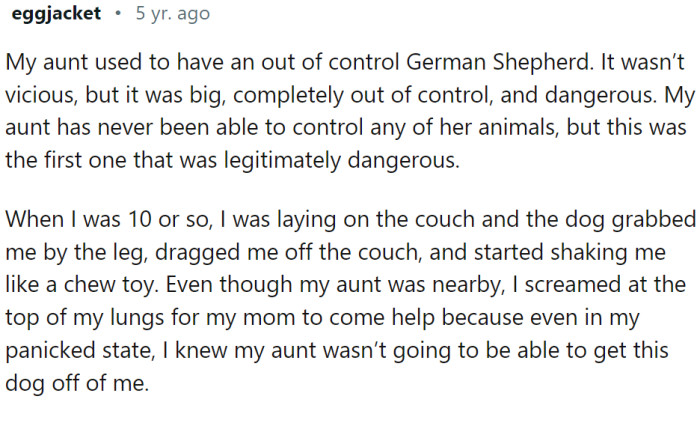
Fifteen years later, and she still won't admit the dog was dangerous. Yes, because it would mean she was a bad owner.
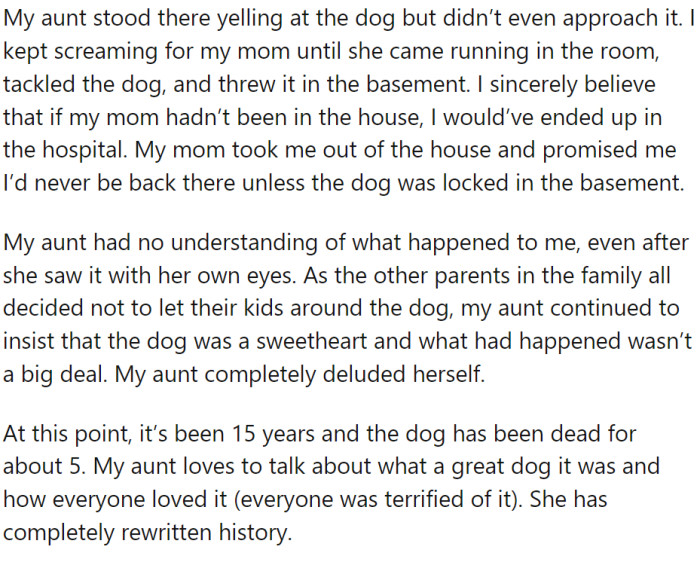
"Even if your girlfriend decides to stay with you, she’s always going to talk about that dog..."
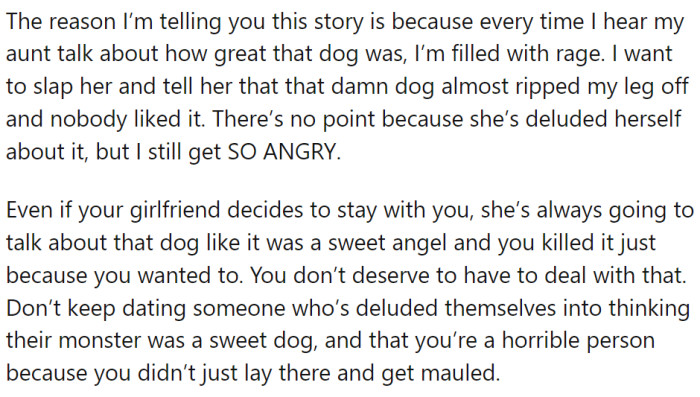
The Role of Defense Mechanisms
In high-stress scenarios, people often resort to defense mechanisms, which can cloud judgment. According to research by Dr. Anna Freud, such mechanisms can distort reality, resulting in blame-shifting or rationalization.
In OP's case, his girlfriend's accusations may stem from a psychological defense against guilt or fear of losing her pet. Understanding these responses can facilitate healthier coping strategies, such as mindfulness or therapy, which encourage individuals to confront their feelings rather than deflect them.
Understanding Relationship Dynamics
Relationships often involve complex dynamics where fear and miscommunication can lead to significant misunderstandings.
Studies suggest that a lack of clear communication can exacerbate conflicts, making it essential for partners to discuss their feelings and concerns openly.
"She's lucky OP didn't try to prosecute"
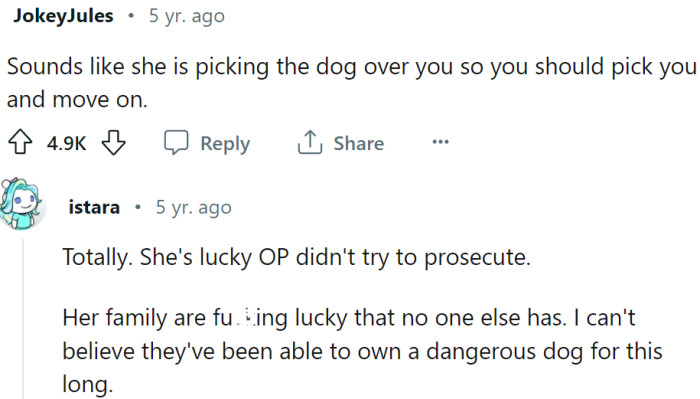
It is time to move on...

"She still isn't asking if you're okay, so I say walk away from it all."
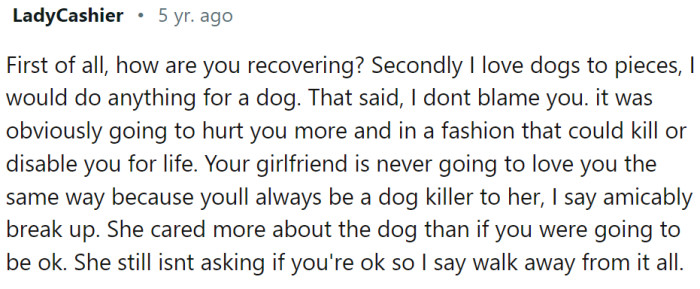
Studies in behavioral psychology emphasize the importance of addressing perceived threats in relationships. Research by Dr. Susan Johnson on Emotionally Focused Therapy shows that when partners feel insecure, they may misinterpret actions as hostile.
This misinterpretation can intensify emotional responses and lead to conflicts. Couples facing similar situations should consider engaging in constructive dialogue to express feelings without blaming, fostering a safer emotional environment that can aid in conflict resolution.
Practical solutions include establishing a shared understanding of pet care responsibilities and discussing boundaries that prioritize both safety and emotional well-being.
Research indicates that couples therapy can also be beneficial in navigating such conflicts by fostering open dialogue and understanding.
This is not going to work out
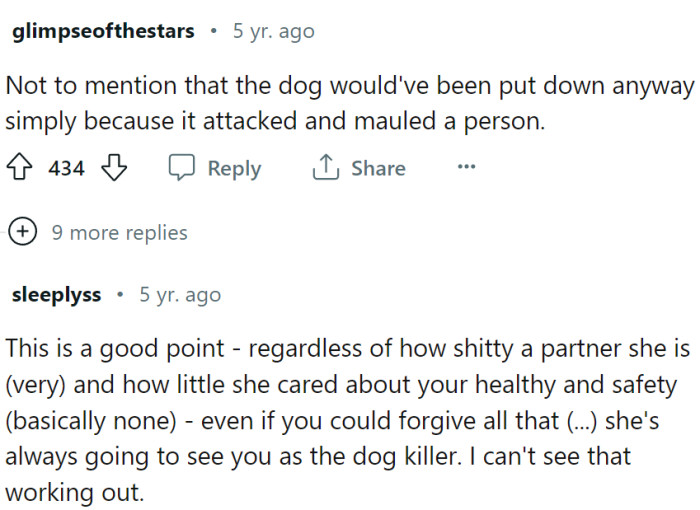
The bottom line is - OP did nothing wrong
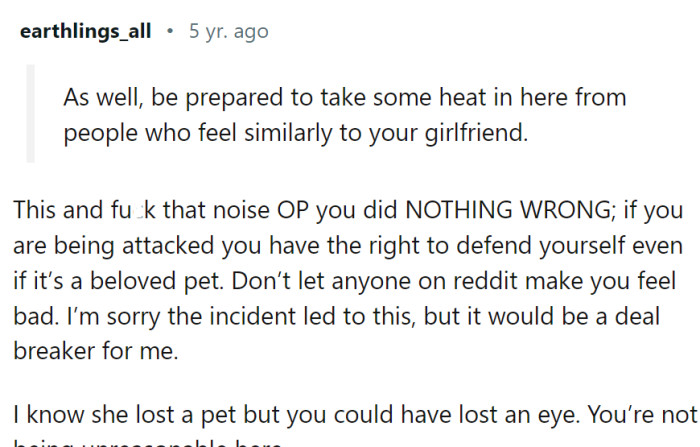
The story of OP's harrowing encounter with Satan, the vicious Doberman, not only exposed the dog's uncontrolled aggression but also unearthed profound fissures in his relationship with his girlfriend. The incident has stirred a chorus of opinions among Reddit users, many of whom believe that OP's actions were not only justified but that he should have gone further and pressed charges against the dog's owners.
The seeming lack of empathy and understanding from OP's girlfriend, who was more concerned about the dog's welfare than OP's life-threatening injuries, has led many to conclude that there may be no future for the couple. The incident revealed a stark contrast in values, and OP's girlfriend's unwillingness to view the situation from his perspective points to deeper issues in their relationship.
The Role of Trust in Relationships
Trust is foundational in relationships, and breaches can lead to significant emotional fallout.
According to research from the Journal of Family Psychology, rebuilding trust requires transparency, accountability, and effective communication.
Partners must work together to create a safe environment where both feel secure in expressing their needs and fears.
Psychological Analysis
This situation highlights the intense emotions that can arise when pets are involved in conflicts. The man's reaction stems from a protective instinct, which can be misunderstood by his partner.
It's crucial for both partners to navigate these feelings with empathy and understanding to promote healing and resolution.
Analysis generated by AI
Analysis & Alternative Approaches
Understanding the complexities of pet-related conflicts can enhance relationship dynamics.
Research shows that clear communication and mutual respect are key factors in resolving misunderstandings.
Ultimately, fostering trust and collaboration can lead to healthier and more fulfilling relationships.
Psychological Analysis
The girlfriend's reaction shows how our emotional attachments, whether to pets or people, can cloud our judgment and empathy. It seems like she's struggling with cognitive dissonance, trying to reconcile her love for her pet and her boyfriend. Open, honest communication might be the key to resolving this conflict, but it's clear there are deeper issues at play here.
Analysis generated by AI
Professional Assessment & Guidance
Understanding the complexities of interpersonal relationships, particularly in crisis situations, is essential. Research consistently highlights that emotional responses often stem from perceived threats, which can distort communication.
As studies indicate, fostering open dialogue and employing effective communication strategies can significantly mitigate misunderstandings. By recognizing the underlying psychological mechanisms at play, individuals can cultivate healthier relationships, ensuring that conflicts are resolved empathetically rather than defensively.



